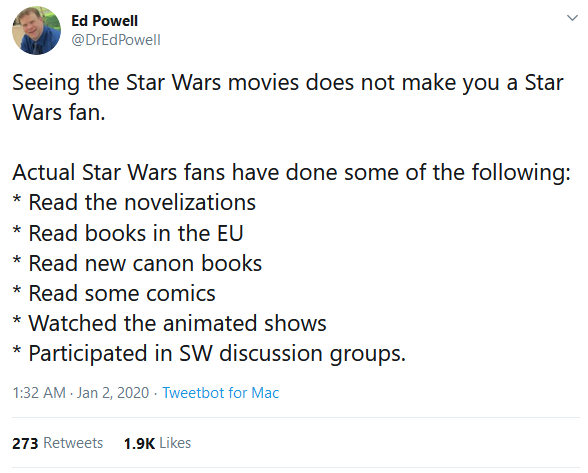
Hi everyone, this last summer-break edition ties in with the previous edition. Last week I’ve wrote over research to make publication metadata from the free publishing service CEUR-WS available in a FAIR fashion , such that the data can be explored.

Hi everyone, this last summer-break edition ties in with the previous edition. Last week I’ve wrote over research to make publication metadata from the free publishing service CEUR-WS available in a FAIR fashion , such that the data can be explored.

Recently some guy tweeted “Seeing the Star Wars movies does not make you a Star Wars fan. Actual Star Wars fans have done some of the following…” This is a great opportunity for me to talk about a particular kind of category fight: coercion. Over the past several years I’ve written about some things people try to do with categories: watchdogging, gatekeeping, pedantry, eclipsing and splitting.

I’ve written in the past about instrumentalism, the scientific practice of treating theories as tools that can be evaluated by their usefulness, rather than as claims that can be evaluated as true or false. If you haven’t tried this way of looking at science, I highly recommend it! But if theories are tools, what are they used for? What makes a theory more or less useful?

The big buzz over the past few years has been Data Science. Corporations are opening Data Science departments and staffing them with PhDs, and universities have started Data Science programs to sell credentials for these jobs. As a linguist I’m particularly interested in this new field, because it includes research practices that I’ve been using for years, like corpus linguistics and natural language processing.
In a comment, Candy asked: Can we also please talk about how “cis” is used as a term of abuse against feminists? As in, “shut up privileged cis bitches?” It’s the bit where trans activism begins to overlap with Men Rights Activism.
Imagine that you belong to a category, like “tourist.” You fit all the necessary conditions for membership in that category: you are traveling to another part of the world for recreation. But that category has a bad reputation – literally a bad name. What do you do? You split the category.
People say you should stand up for what you believe in. They say you should look out for those less fortunate, and speak up for those who don’t get heard. They say that those of us who come from marginalized backgrounds, like TBLG backgrounds for example, but have enough privilege to be out in relative safety should speak up for those who don’t have that privilege.

I’m a parent. It doesn’t make me better or worse than anyone else, it’s just a category that reflects some facts about me: I conceived a new human with my wife, we are raising and caring for that human, and we expect to have a relationship with him for the rest of our lives. Some people don’t take parenthood seriously, so it doesn’t impact their lives very much, but their kids suffer.
Gretchen McCulloch has been posting about epistemic modality on her All Things Linguistic blog recently. If you don’t know what epistemic modality is, very briefly, in many languages (including English), there are words that are ambiguous in a particular way: between saying something about our social and moral codes, and saying something about our knowledge of the world. Consider this expression of necessity: She should be there by now.